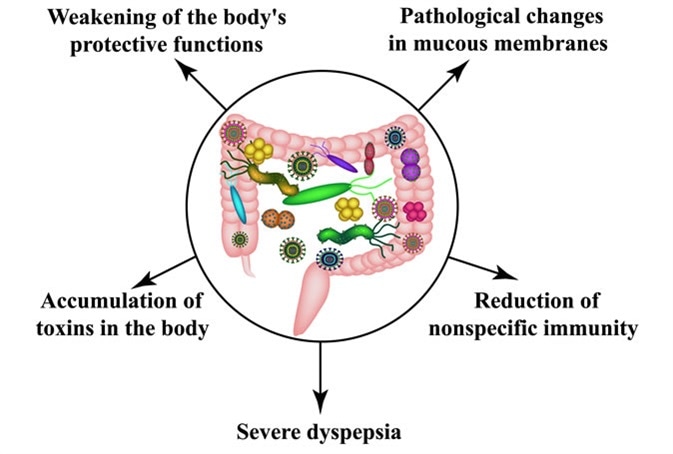Dysbiosis, also called dysbacteriosis, is a condition where the bacteria in the gut are imbalanced, causing a wide array of digestive disturbance symptoms.
What is Dysbiosis?
The body is full of colonies of harmless bacteria called microbiota. These bacteria are beneficial to the body as they have a positive effect on the body’s natural processes. However, when these healthy bacteria become imbalanced, the harmful or pathogenic bacteria begin to dominate, leading to illness.
Gut bacteria are essential for life. There are about more than 400 species of bacteria that make up the gut microbiome. In fact, there are more bacteria in the gut than a person’s cells in the body. These gut bacteria are important as they help digest food, ward off harmful pathogens, and synthesize vitamins.
Dysbiosis happens when the bacteria in the gastrointestinal tract goes out of balance, leading to a wide range of symptoms of digestive disturbance. Dysbiosis has been linked to other diseases that can affect the intestines such as inflammatory bowel disease and other gastrointestinal conditions. These include gastritis, irritable bowel syndrome (IBS), peptic ulcer disease, and gastric or colon cancer.

Consequences of intestinal dysbiosis. Dysbacteriosis of the colon. Image Credit: Timonina / Shutterstock
Causes and Risks
When there is an interruption in the balance of microbiota, it can lead to dysbiosis. There are many possible causes of this condition. A dietary change wherein there is an increased intake of sugar, protein, and food additives may lead to dysbiosis. The other causes include frequent antibiotic use, excessive alcohol consumption, frequent antacid use, accidental ingestion of pesticides or exposure to chemicals, chronic physical or psychological stress, previous parasitic or bacterial infection of the gastrointestinal tract, and a diet that is low in fiber.
Other causes include consuming new medications that can affect the gut flora, poor dental hygiene, anxiety, and unprotected sex that can expose the person to bacteria. Some studies have linked being formula fed and born via C-section, as some factors can change the type of strains of beneficial bacteria present in newborns. These factors can increase the risk of developing gut dysbiosis in later life.
#GMFH2016 Francisco Guarner - How Would You Define "Dysbiosis"?
Signs and Symptoms
The common signs and symptoms of dysbiosis include stomach ache, feeling bloated, abdominal cramping, diarrhea, constipation, indigestion, and reflux. In some cases, people may experience food intolerances, fatigue, lowered mood, heartburn, joint pain, and skin conditions.
Prevention
There are many ways to prevent dysbiosis. Lifestyle changes can help maintain the balance of gut bacteria and prevent the overgrowth of bacteria from happening.
Antibiotic Use Only When Needed
Do not overuse antibiotics. Take the medicine only when prescribed by a physician. If antibiotics are not needed, for instance in a viral infection, avoiding these drugs are important. Antibiotics are greatly destructive to healthy colon bacteria. Use them only when absolutely needed.
Prebiotic or Probiotic Use
Talk to your doctor about prebiotic and probiotic use. Taking prebiotics, which are healthy plant fibers present in many foods to trigger the growth of good bacteria in the colon, can help reduce the risk of dysbiosis. Taking probiotics, which are live microorganisms that when given in adequate amounts, can provide health benefits to the body, and can help prevent and treat dysbiosis.
Limit Alcohol Intake
Drink less alcohol or avoid it altogether. Alcohol can interrupt the gut bacteria balance in the gastrointestinal tract.
Practice Good Dental Hygiene
Brush the teeth and floss regularly. These can prevent the bacteria from growing uncontrollably in the mouth. When there is an overgrowth of bad bacteria in the mouth, it can also affect other parts of the gastrointestinal tract.
Avoid Bowel Cleanses
Bowel or colon cleanses can strip off the good bacteria from the colon, which may lead to the overgrowth of bad bacteria.
In a nutshell, avoiding certain foods, lifestyle changes, and avoiding the overuse of antibiotics are just some of the ways to prevent dysbiosis. The gut bacteria balance is important for overall health. Hence, when it becomes imbalanced, it can lead to a series of digestive symptoms that can adversely affect overall health. Making sure the gut bacteria is balanced is the priority goal of dysbiosis prevention. These include avoiding practices that can lead to the imbalance and making sure you eat the right types of food.
Further Reading
Last Updated: Oct 8, 2018